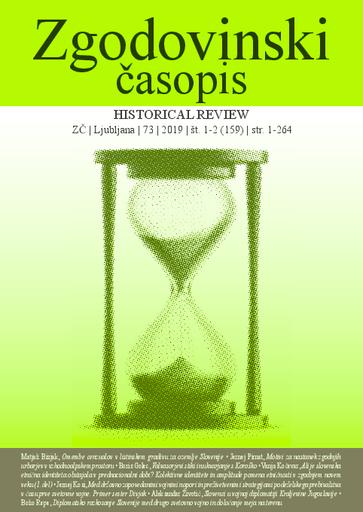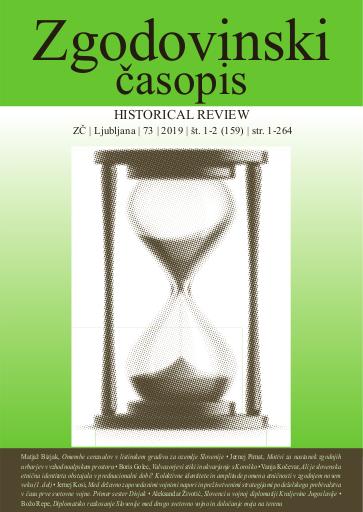/
Serijske publikacije
/
Zgodovinski časopis
Med državno zapovedanimi vojnimi napori in preživetvenimi strategijami podeželskega prebivalstva v času prve svetovne vojne
Primer sester Divjak

Avtor(ji):Jernej Kosi
Soavtor(ji):Peter Štih (odg. ur.), Saša Mlacović (prev.), Vesna Vidmar (drugo)
Leto:2019
Založnik(i):Zveza zgodovinskih društev Slovenije
Jezik(i):slovenščina, angleščina
Vrst(e) gradiva:besedilo
Ključne besede:prva svetovna vojna, ruralno civilno prebivalstvo, Avstro-Ogrska, kazenski pregoni, politika prehranjevanja, World War I, rural civil population, Austria-Hungary, criminal prosecutions, food policy
Avtorske pravice:

To delo avtorja Jernej Kosi je ponujeno pod Creative Commons Priznanje avtorstva-Nekomercialno-Deljenje pod enakimi pogoji 4.0 Mednarodna
Datoteke (1)

Ime:ZC_2019_1-2.pdf
Velikost:11.75MB
Format:application/pdf
Stalna povezava:https://hdl.handle.net/11686/file25389
Opis
Članek opisuje in analizira okoliščine pregona sester Divjak, ki so ga leta 1916 izpeljale avstrijske oblasti. Vojni režim si je od izbruha spopadov naprej iz strateških razlogov prizadeval racionirati prehranske vire. Oblast je poskušala nadzor nad proizvodnjo in cirkulacijo doseči z vrsto ukrepov. Represivne in propagandne resurse je tako usmerila tudi na podeželsko prebivalstvo, ki je bilo v času vojne najpomembnejši produkcijski vir hrane. Toda avstrijski kmetovalci v številnih primerih niso kazali pretirane pripravljenosti prispevati svojega deleža k vojnim naporom avstrijske monarhije.
Metapodatki (12)
- identifikatorhttps://hdl.handle.net/11686/41443
- naslov
- Med državno zapovedanimi vojnimi napori in preživetvenimi strategijami podeželskega prebivalstva v času prve svetovne vojne
- Primer sester Divjak
- The State-Ordered War Effort and Survival Strategies of the Rural Population during World War I
- The Case of the Divjak Sisters
- ustvarjalec
- Jernej Kosi
- soavtor
- Peter Štih (odg. ur.)
- Saša Mlacović (prev.)
- Vesna Vidmar (drugo)
- predmet
- prva svetovna vojna
- ruralno civilno prebivalstvo
- Avstro-Ogrska
- kazenski pregoni
- politika prehranjevanja
- World War I
- rural civil population
- Austria-Hungary
- criminal prosecutions
- food policy
- opis
- In the early summer of 1916 the Maribor district court approved the indictment proposal submitted by the public prosecutor; consequently, the Divjak sisters from Ročica pri Sv. Lenartu were sentenced to a week’s imprisonment. The sentence passed “on behalf of his Majesty the Emperor” was additionally harshened because it stipulated that the defendants were to spend one out of seven nights behind bars on a hard bed. Upon the passing of the sentence Marija and Elizabeta Divjak were at the venerable age of 76 and 74 respectively; up to that point they had been unpunished and deemed morally fi t Austrian citizens. Why were two elderly women, who were in all respects considered to be model landowners from a small village to the north of Maribor and whom the local municipal governor described as »lost and of unclear mind due to their old age”, subjected to criminal prosecution and trial? The Divjak sisters were sentenced to a week’s imprisonment on the basis of the regulation that drastically limited the crop owners’ and cereal processors’ right of ownership in the Austrian part of the monarchy. They were no longer allowed to dispose freely of their supplies; moreover, in the event of disobedience they could be subjected to expropriation and their produce was sold at an offi cially stipulated price and a 10% discount. An Imperial Order on the Provision of Cereals and Flour issued by the emperor almost a year after the outbreak of World War I is merely one in the series of more or less repressive wartime regulations by means of which the Austrian authorities attempted to regulate the civilians’ everyday life behind the front up to the reopening of the Parliament in 1917. The main purpose of the emerging ad hoc normative framework, which was based on emperor’s orders, was to make the civilian population behind the front take over, by fair means or foul, a considerable share of the burden on the “home front”. However, the case of the Divjak sisters indicates that the civilian population’s survival strategies often clashed with the state’s interests, demands, and expectations. The extant sources reveal that the population in the Austrian hinterland deliberately often put up resistance to the demands of the existing normative framework and values. The repressive apparatus thus often focused on women civilians, who would sooner risk going to prison than be starved to death. The article at hand aims to depict general circumstances, strategic considerations, and legal underpinnings that shaped the wartime repressive legislative framework. Based on the Divjak sisters’ criminal records sisters and several other documented cases from Lower Styria and Carniola, the article provides insight into how women attempted to evade the grip of demands and expectations of the Austrian administrative apparatus. During World War I, the Austrian authorities demanded sacrifi ce and austerity from the Cisleithanian civil population; the same was expected also from landowners and farmers. It was not only the war machine in the battlefi elds that relied on their willingness to comply with the demands and expectations of the absolutist regime during the war, this applies also to the operation of the military apparatus in factories and offi ces of the Austrian hinterland. When maintaining loyalty and discipline of the rural population, the authorities made use of two welltried methods of each undemocratic regime. The holders of power threatened openly with a stick and used it in their prolonged and consequent punishment of individuals violating the rules and instructions by means of which the regime strove to discipline the population in the hinterland from August 1914 up to the restoration of the constitutional life in May 1917. Concurrently, the rural population was littered with propaganda texts, i.e. with a patriotic rhetoric that was to encourage them to practice even greater austerity and to make offerings to the homeland’s altar. However, historiographical research results lead to the conclusion that the Austrian citizens’ patience was not endless. Particularly in cities, where the conditions brought about by the food shortage were especially harsh, the fi nal year of the war saw the population take part in protests and show obvious signs that their loyalty was on the wane. Days, weeks, and years that the civilian population in the hinterland spent in hardship, being subjected to shortages and famine, did not only begin to eat away old Austria’s social system but they also broke the legitimacy of the regime’s political and military goals. Namely, the regime that confi scated produce and demanded austerity but at the same time failed to provide the population with the most basic goods. The question of loyalty and willingness of the Cisleithanian rural population to practise austerity for the sake of higher ideals is much more poorly researched than the wartime reality in the cities. However, judging from what was demonstrated, the practice of acceptance, tolerance and evasion of demands and expectations of the Austrian authorities, also in the case of landowners and farmers, did not differ greatly from the events taking place in the cities. Primarily, farmers wanted to survive as well. They thus adjusted their survival strategies to the general social circumstances, even if that meant being prosecuted or punished. However, several pointers indicate that many of them were reluctant to practice austerity at a considerably earlier point than the impoverished urban population. Nevertheless, similarly as in the cities, with the ongoing war and greater hardship the concealed and passive opposition grew into a general dissatisfaction throughout the countryside and, so to speak, into an open resistance. It was indeed not diffi cult to subject two elderly women farmers to criminal prosecution, sentence them and confi scate their unregistered food or produce in the proximity of Maribor in 1916. However, almost two years later the conditions in many places in the countryside were markedly different.
- založnik
- Zveza zgodovinskih društev Slovenije
- datum
- 2019
- 01. 05. 2019
- tip
- besedilo
- jezik
- Slovenščina
- Angleščina
- jeDelOd
- pravice
- licenca: ccByNcSa
